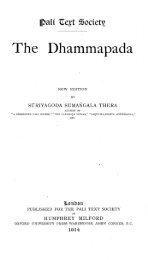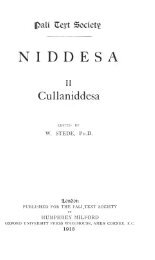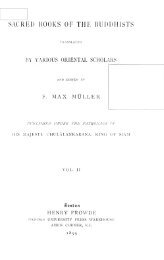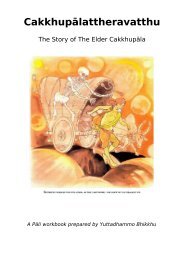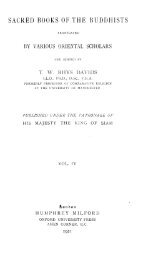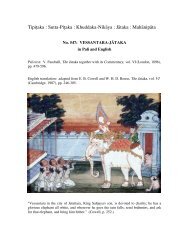Lessons In Practical Buddhism - Sirimangalo.Org
Lessons In Practical Buddhism - Sirimangalo.Org
Lessons In Practical Buddhism - Sirimangalo.Org
You also want an ePaper? Increase the reach of your titles
YUMPU automatically turns print PDFs into web optimized ePapers that Google loves.
Unfortunately, we tend to bring this sort of attitude to the<br />
meditation practice as well. We know that we are here to<br />
gain wisdom, to understand reality in a more profound way.<br />
That's usually why someone decides <strong>Buddhism</strong> is for them,<br />
because they realize that wisdom is the most important tool<br />
in attaining true peace and happiness. Yet, even though we<br />
appreciate this intellectually, when we actually practice<br />
meditation we still tend to incline towards "fixing" our<br />
problems, rather than understanding them.<br />
When pain arises, we tend to expect that by saying "pain,<br />
pain" to ourselves the pain should go away. We tend to be<br />
reluctant to use the same method on pleasant experiences<br />
for the same reason, thinking if it isn't broken, why "fix" it?<br />
When we begin to realize that the meditation practice<br />
doesn't actually help us to remove unpleasant experiences<br />
or cultivate pleasant ones, we are more than ready to reject<br />
it, forgetting our intention to cultivate wisdom entirely. We<br />
see that, rather than fixing our problems, this method forces<br />
us to do the opposite and accept our problems without trying<br />
to fix them; something that goes very much against our<br />
ingrained inclination towards problem-solving.<br />
Truly, wisdom can only come when we look at our problems<br />
objectively. The word for wisdom in Pali is "paññā", which<br />
means to know something completely. "pa" means<br />
completely, "ñā" means to know. The wisdom we are<br />
seeking is simply the complete understanding of the nature<br />
of the objects of experience, the very problems that we seek<br />
to chase away.<br />
What is the wisdom? Wisdom is when you say to yourself<br />
'stepping right' - at the moment when you know 'this is<br />
stepping right,' that's wisdom. Yet we tend to wonder how<br />
that can be; we are convinced that this cannot be true<br />
wisdom, that the Buddha couldn't have taught something so<br />
simple. What did the Buddha teach us to know, though? He<br />
taught us to understand the truth of suffering, to see<br />
suffering as a truth inherent in all experience. All experience<br />
is considered to be dukkha because it can't satisfy us - it's<br />
not worth anything, it's useless. So, how do you come to<br />
know that something is dukkha? Obviously, you must come<br />
to see it for what it is. <strong>In</strong> order to see it for what it is, you<br />
136



